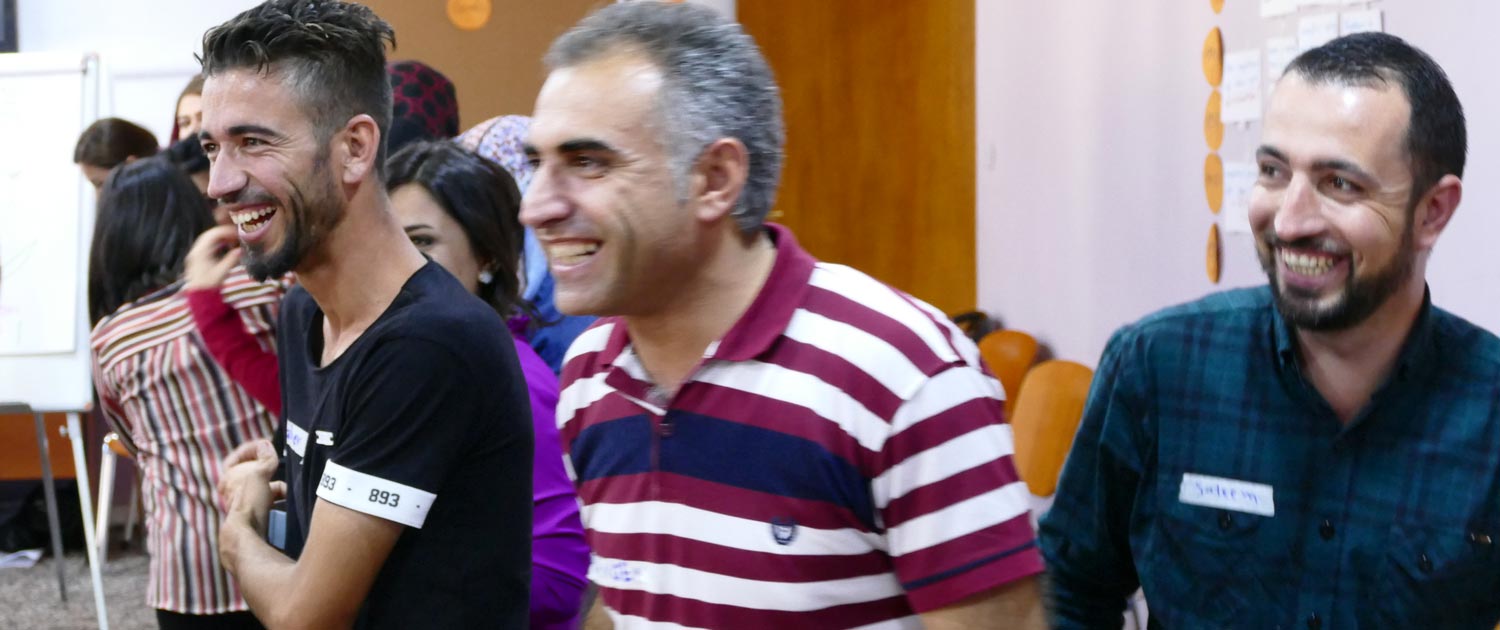What is psychosocial support?
Human beings need not only food and water for living, but also the interaction with other human beings. This is especially important when living and working in stressful situations. Be it living in a camp as a refugee or IDP, or be it as a social worker supporting people in a community: You need support from other people to keep your head up. This may be your family, or friends, or colleagues.
A psychosocial perspective looks at human functioning in the context of its social environment. So, psychosocial support in very general terms, refers to helping people in dealing with their lives, while taking psychological, social, and circumstantial conditions into account.
The UN defines psychosocial support as follows: Psychosocial support helps individuals and communities to heal the psychological wounds and rebuild social structures after an emergency or a critical event. It can help change people into active survivors rather than passive victims. Disasters, conflicts and health problems have severe psychosocial consequences. The emotional wounds may be less visible than the destruction of homes, but it often takes far longer to recover from emotional impact than to overcome material losses.
Is psychosocial support something like psychotherapy?
No. Psychosocial support has a broader scope and often targets whole communities, while psychotherapy traditionally focusses on the individual client.
Besides, you do not need a training as a therapist to give psychosocial support to other people.
Why is psychosocial support so important for community work?
People have needs. Difficult situations can make it difficult to have those needs met. This is where psychosocial support can be useful.
If you are confronted with conflicts, with unexpected difficulties, if you do social work for people that are traumatized or victims of violence, you will be aware of their need for psychosocial support as well as your own need for personal support.
How do escape and violence affect people, and how do I recognize this effects?
There is no singular way how this plays out. The conditions of escape, the experiences of violence suffered by people are not to be generalized. You need to learn about the whole story before coming to conclusions. There may be obvious effects to observe, but you can be sure that there are also some hidden effects. Some of them may be beyond your competence to handle, but even discovering them is an important step. Only then it is possible finding ways to treat them.
Who can provide psychosocial support to others?
While basic training in psychosocial care is certainly recommended for everyone working in psychosocial support, being authentically present as a human being goes a long way. This means, it’s not only the methods applied, but your own approach towards people that makes psychosocial support successful. Empathy is an important means of psychosocial support.
What are methods of psychosocial support?
There’s a lot of different methods to provide psychosocial support that cannot be described here in short terms.
If you are participant in the Jiyan workshops mentioned on this website, you may find more information in the internal download area.
If you want to learn more on the implementation of psychosocial support, the following links may be useful:
International Federation of Red Cross and Red Crescent Societies
Psychosocial support in emergencies (IFRC)
Safe the Children’s Resource Centre
World Health Organization (focussing on HIV/AIDS)
How do I deal with a person in a personal crisis?
Besides being open minded and empathic towards a person in crisis, it is hard to give generalized advise. It is necessary to know the specific circumstances before you decide what is the right thing to do. It makes no sense to list a “best of” methods in crisis intervention.
If you are participant in the Jiyan workshops mentioned on this website, you may find more information in the internal download area.
Otherwise, you should consider seeking support by professionals in your community.
How do I recognize if someone is at risk?
This question needs specific answers that cannot be given in a generalized way. You need to know circumstances and details of the respective person.
If you work open eyed with vulnerable people in critical situations, you will sooner or later get a feeling for people at risk.
If you are participant in the Jiyan workshops mentioned on this website, you may find more information in the internal download area.
Otherwise, you should consider seeking support by professionals in your community.
What can I do to take care of myself and my own psychosocial health?
If you are participant in the Jiyan workshops mentioned on this website, you may find more information in the internal download area.
Otherwise, you should consider seeking support by professionals in your community.
How can I help a person with suicidal tendencies?
If you are participant in the Jiyan workshops mentioned on this website, you may find more information in the internal download area.
Otherwise, you should consider seeking support by professionals in your community.



